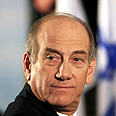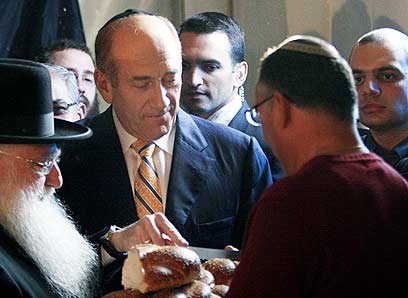
Olmert: Working premise is troops are alive
Prime minister claims he was misunderstood when he said Monday war was stopped because 'we didn’t know if soldiers are alive.' According to him, statement referred to information Israel had at start of fighting
Talking to reporters, Olmert referred to the statement he made Monday, according to which the war in Lebanon was stopped because "we didn’t know if the soldiers are alive," and explained that it was a misunderstanding.
In the discussion, the prime minister tried to explain that he was referring to information he had in August, when the war started. According to him, at first there was a concern that the soldiers are not alive, but today's information leads to the working premise that they are still alive.
The prime minister visited Kiryat Malachi in order to inaugurate sports fields in the city donated by the International Fellowship of Christians and Jews, at the cost of NIS 9 million (USD 2.13 million).

Olmert tours Kiryat Malachi (Photo: Tsafrir Abayov)
On Monday afternoon, Olmert sat down with high-school students from the northern city of Nahariya and answered some tough questions about the war.
"We didn't know if they were alive and it is preferable that they spend a little more time in captivity than having more soldiers die," said Olmert when asked why Israel ended the war without receiving kidnapped soldiers Ehud Goldwasser and Eldad Regev back.
The question came from an 11th grader who studies at the Amal school in Nahariya, Ehud Goldwasser's alma mater.
Olmert gave it particular consideration: "What were we to do? Keep fighting and turn dozens of families into bereaved ones? Do this so that they, and I hope that they are alive, will spend a little less time in captivity? So they will spend a little more time in captivity."
Families: Talk less and do more
The organization for the release of the kidnapped soldiers said that the families of the captive soldiers asked the PM to clarify his statements.
"It has been made clear that the prime minister isn't belittling the time our sons are held captive and that his comments were made in response to a specific question regarding the ceasefire agreement. We are satisfied with the answer, though we demand that the pm tone down his remarks.
"This is the second time this week we've heard inappropriate comments regarding the situation and status of the captives from him."
Family representatives also said that they expect Olmert to "talk less and do more."










